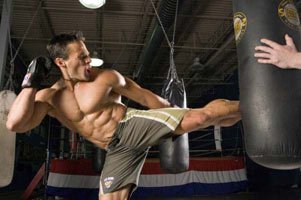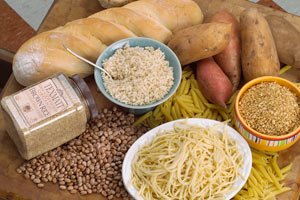With the hectic schedules we all have these days, if you're going to invest time into becoming a great fighter you want to get the greatest possible benefit.
When it comes to maximizing the results you get from your training sessions, the nutrients and supplements that you consume after you get finished could have a huge impact on how you'll be rewarded for the work you did while you were there.

 Click Image To Enlarge.
Click Image To Enlarge. If You're Going To Invest Time Into Becoming A Great Fighter
You Want To Get The Greatest Possible Benefit.
Post-Workout Nutrition
During intense exercise, our bodies use carbohydrates, glycogen, amino acids and fluids at a rapid rate, creating what is often referred to as a catabolic state.
Our goal with your post-workout nutrition is to return the body to an anabolic state as soon as we can once your training session is over. This will help you recover from the training session so you can be ready for the next one, which will both cut down your risk of injury and allow you to improve your skills and conditioning at a faster rate.
Let's take a look at some general guidelines to get you there as effectively as possible.
Carbohydrates
Glycogen replenishment is absolutely critical after a workout, which means that you need to focus on carbohydrate intake. However, you don't need EXCESSIVE carbs, ever, post-workout or at any other time. But, you do want to take in carbs after you train for several reasons.
First, we do want to replenish your glycogen stores so that your now suppressed energy levels don't make the rest of your day (or night) a study in lethargy.
Second, and perhaps most importantly, carbohydrates elevate insulin levels, which is the hormone responsible for the transport of carbs and amino acids into the muscle cell.
When this occurs, not only is the rebuilding of glycogen levels facilitated more effectively, but the body begins to get back to an anabolic state leading to the repair and enhancement of your lean muscle tissue. Breaking down lean muscle tissue is the last thing anyone wants.
The question of how many carbs and the type of carbs you should consume in this post-workout period becomes the next thing for us to look at.
Given that the post-workout goal is to elevate insulin through the use of carbohydrates, you'll want to consume high-glycemic carbs post workout. Examples of high glycemics include white rice, baked potatoes, bagels, instant oatmeal and white flour pastas.
The amount of carbohydrate is going to be largely based on a few factors ... your metabolism, the intensity and duration of the workout and whether your primary goal at this time is to cut weight (for example, as you get closer to a fight) or maintain or add as much muscle mass as possible.
As a general guideline, most of us have a total daily carbohydrate intake that we shoot for each day. I would try to consume at least 50% of those carbs in the pre- and post-workout meals. As an example, if you take in 200 grams of carbs per day, take 50 grams before training and another 50 after, for a total of 100 grams.
Protein and Fat
Protein is a very important component of your post-workout meal, while fat is not. In fact, you want to keep this meal as low in fat as you possibly can.
The goal at this point in your meal plan is to get protein, carbs and amino acids into the muscle as fast as possible to begin the repair and recuperation process as well as rebuilding the lean muscle tissue that you've broken down during your workout.
Fats slow digestion, which is the opposite of what we are trying to accomplish. Ideally, you'll want to take in lean proteins such as egg whites, poultry, fish and seafood. However, another option that you might find more practical (and easier to digest) after you workout would be a whey protein drink.
As for the amount of protein, take in whatever number of grams your nutritional program calls for you to eat at each meal.
Supplementation
Glutamine
Glutamine is a non-essential amino acid that accounts for half of the amino acids in your muscle tissue. When you train, glutamine is released from the muscle to support your immune system. As a result, for optimal results, you'll want to replenish glutamine after your workout. Follow the usage guidelines on the product you choose.
BCAA
Branched Chain Amino Acids ("BCAA") are three essential amino acids, Isoleucine, Leucine and Valine, that the body cannot make on its own. As a result, they must be supplied by your food and/or supplement intake.
If you do not have sufficient BCAA levels in your system, your body will break down your muscle tissue to get the BCAA it needs. Intense workouts, cardio vascular workouts and lowered calories (like when you are leaning out or dropping weight for a fight) all deplete BCAA.
And an added benefit of BCAA is that they also help replenish glutamine, which we've already discussed is necessary after you workout as well. Follow the usage guidelines on the product you choose.
Hydration
Dehydration is a dirty word when it comes to anything that has to do with muscle. Not only will you feel terrible if you get dehydrated, but it will actually inhibit maintaining muscle tissue on the cellular level.
As a general rule, the more you sweat, the more you should drink, both during and after you train. I know it's common sense, but you need to be conscious of it to maximize both your health and your results.
Your Post-Workout Game Plan
Every time you train, you have a choice when that workout is over. You can take a few important steps to get the full effect and benefit of all that hard work you just did, or you can ignore these steps and leave a lot of your results on the gym floor.
- Make sure to hydrate during and after your workout.
- As soon as you are done with your workout, take your glutamine and BCAAs.
- Sometime in the next hour or so, consume high glycemic carbohydrates, protein (whether solid food or a high quality protein powder) and keep fat intake to an absolute minimum.

